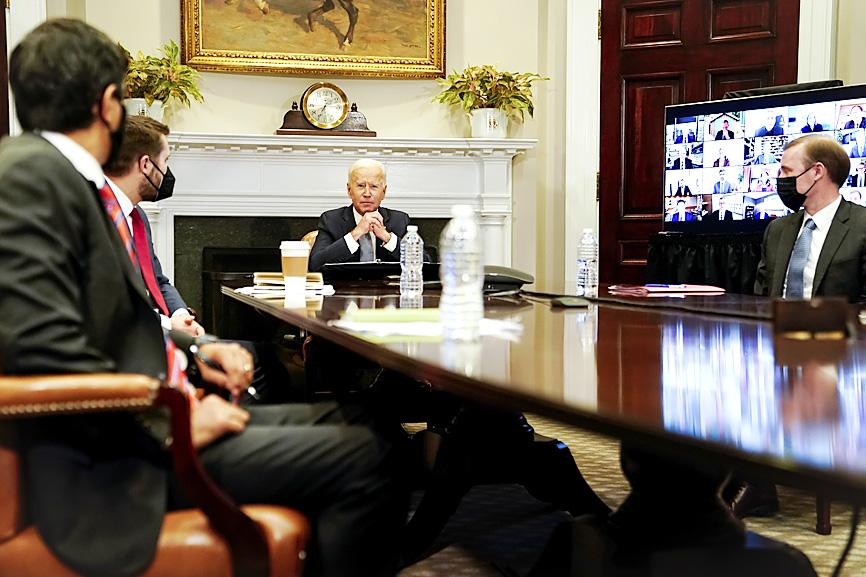Taiwan Semiconductor Manufacturing Co (TSMC, 台積電), the world’s largest contract chipmaker, on Monday took part in a virtual White House summit about a global semiconductor shortage and Washington’s plans to strengthen US supply chains.
The Hsinchu-based company was among 19 firms, including fellow chipmakers Samsung Electronics Co, GlobalFoundries Inc and Intel Corp, that attended the summit hosted by US National Security Adviser Jake Sullivan, US National Economic Council Director Brian Deese and US Secretary of Commerce Gina Raimondo.
US President Joe Biden told executives in the meeting that there is bipartisan support in the US Congress for efforts to strengthen the US semiconductor industry to better protect the manufacturers that rely on it.

Photo: EPA-EFE
Earlier in the day, Biden said that he had received a letter from a bipartisan group of 23 US senators and 42 US representatives, urging passage of the Creating Helpful Incentives for Producing Semiconductors for America Act, a proposed US$50 billion investment in semiconductor manufacturing and research.
Biden said that companies that make and use semiconductors, as well as US consumers, would benefit from a US$2 trillion infrastructure plan that he has put before lawmakers.
“These chips, these wafers ... batteries, broadband — it’s all infrastructure. We need to build the infrastructure of today, not repair the one of yesterday,” Biden said, adding that his plan would “protect our supply chains and revitalize American manufacturing.”
Intel chief executive officer Pat Gelsinger said in an interview after the meeting that the White House and Congress are working aggressively to support the semiconductor industry with more domestic manufacturing, research and development, and efforts to build the workforce.
TSMC also voiced its support. The contract chipmaker, which plays a central role in manufacturing most of the world’s most advanced semiconductors, has secured US government incentives to begin building a US$12 billion advanced chip plant in Phoenix, Arizona, this year.
TSMC chairman Mark Liu (劉德音) issued a statement after the meeting that highlighted his company’s investments in the US, but did not directly address what was discussed.
TSMC’s planned US$12 billion investment constitutes one of the US’ largest overseas investment plans in the past few years, Liu said, adding that he was confident the project would succeed with continued bipartisan support from Washington.
Monday’s meeting took place amid a shortage of computer chips that has hampered the global economic recovery from COVID-19, and prompted Biden in February to order a comprehensive review of US supply chains.
US automakers General Motors Co and Ford Motor Co, both of which attended the meeting, have had to announce production cuts and temporary plant closures in the past few weeks amid difficulties sourcing automotive chips.
Many major auto manufacturers cut their chip orders last year due to plunging demand caused by the COVID-19 pandemic.
Because those openings in chipmakers’ production schedules were later filled by orders from other industries, the automakers are now struggling to keep up with rising consumer demand.
However, the White House said that the summit was not intended to provide immediate solutions, but rather to consult with stakeholders on how the issue could be better addressed going forward.
Additional reporting by Bloomberg

Power supply and electronic components maker Delta Electronics Inc (台達電) yesterday said second-quarter revenue is expected to surpass the first quarter, which rose 30 percent year-on-year to NT$118.92 billion (US$3.71 billion). Revenue this quarter is likely to grow, as US clients have front-loaded orders ahead of US President Donald Trump’s planned tariffs on Taiwanese goods, Delta chairman Ping Cheng (鄭平) said at an earnings conference in Taipei, referring to the 90-day pause in tariff implementation Trump announced on April 9. While situations in the third and fourth quarters remain unclear, “We will not halt our long-term deployments and do not plan to

‘SHORT TERM’: The local currency would likely remain strong in the near term, driven by anticipated US trade pressure, capital inflows and expectations of a US Fed rate cut The US dollar is expected to fall below NT$30 in the near term, as traders anticipate increased pressure from Washington for Taiwan to allow the New Taiwan dollar to appreciate, Cathay United Bank (國泰世華銀行) chief economist Lin Chi-chao (林啟超) said. Following a sharp drop in the greenback against the NT dollar on Friday, Lin told the Central News Agency that the local currency is likely to remain strong in the short term, driven in part by market psychology surrounding anticipated US policy pressure. On Friday, the US dollar fell NT$0.953, or 3.07 percent, closing at NT$31.064 — its lowest level since Jan.

The US dollar was trading at NT$29.7 at 10am today on the Taipei Foreign Exchange, as the New Taiwan dollar gained NT$1.364 from the previous close last week. The NT dollar continued to rise today, after surging 3.07 percent on Friday. After opening at NT$30.91, the NT dollar gained more than NT$1 in just 15 minutes, briefly passing the NT$30 mark. Before the US Department of the Treasury's semi-annual currency report came out, expectations that the NT dollar would keep rising were already building. The NT dollar on Friday closed at NT$31.064, up by NT$0.953 — a 3.07 percent single-day gain. Today,

The New Taiwan dollar and Taiwanese stocks surged on signs that trade tensions between the world’s top two economies might start easing and as US tech earnings boosted the outlook of the nation’s semiconductor exports. The NT dollar strengthened as much as 3.8 percent versus the US dollar to 30.815, the biggest intraday gain since January 2011, closing at NT$31.064. The benchmark TAIEX jumped 2.73 percent to outperform the region’s equity gauges. Outlook for global trade improved after China said it is assessing possible trade talks with the US, providing a boost for the nation’s currency and shares. As the NT dollar